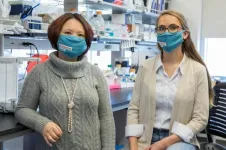How to track the variants of the pandemic faster
2021-03-03
(Press-News.org) "What scientists have achieved in a year since the discovery of a brand-new virus is truly remarkable," says Emma Hodcroft from the Institute of Social and Preventive Medicine (ISPM) of the University of Bern, first author on the piece, "but the tools scientists are using to study how SARS-CoV-2 is transmitting and changing were never designed for the unique pressures - or volumes of data - of this pandemic."
SARS-CoV-2 is now one of the most sequenced pathogens of all time, with over 600,000 full-genome sequences having been generated since the pandemic began, and over 5,000 new sequences coming in from around the world every day. However, the analysis and visualization tools used today (including Nextstrain, co-developed by Prof. Richard Neher's group at the SIB and the University of Basel) were never designed to handle the volume and speed of sequences being generated today, or the scale of the involvement with public health response. "Across the world, genomic surveillance rests on the initiative of academic researchers to find essential answers. Public health decision making would benefit from a more sustainalble collaboration framework," says Christophe Dessimoz at SIB and University of Lausanne.
What an improved sequencing would enable
The genetic sequences from SARS-CoV-2 hold valuable information to implementing effective pandemic policies and staying ahead of the virus. Comparing how many mutations different samples share, for example, allows scientists to track the transmission of the virus - helping to identify super-spreading events and international spread. But at the moment it can be hard to combine this genetic information with other key variables - like who attended an event, and when symptoms appeared - which could help make these methods even more informative.
The 'R-number' has gone from a scientific concept to a household word in the last year - it measures the average number of people an infected person will transmit to. Here, sequences can help too, by helping to pick apart imported cases from local transmission. This allows for a more accurate estimate of Re, but needs high levels of sequencing and complex analyses, which are currently not widely implemented.
Finally, sequencing is the only way to identify and track the many mutations that arise in SARS-CoV-2. While mutations are a normal part of virus life, scientists need to know which are harmless variations and which could change the virus' transmissibility or clinical outcome. Combining sequences, lab work, and computational predictions could allow for a better understanding of mutational impacts, but there's little framework to help these different specialities work together. "The viral data - sequences and associated metadata- must be determined, gathered and harmonized thanks to stable infrastructures compatible with the principles of Open Data to facilitate peer-review by the community and their reuse", says Christophe Dessimoz at SIB and University of Lausanne, last author of the comment.
Benefits for Switzerland
"In Switzerland, the population could benefit from more systematic and representative sequencing, for example through better contract tracing, targeted isolation and quarantine of smaller regions, and guiding the closing and opening of schools based on the presence of certain variants", explains Emma Hodcroft. Harmonisation of health data practices is also a critical topic. Switzerland is already putting a lots of efforts at the national level through the Swiss Personalized Health Network (SPHN).
The researchers are convinced that Switzerland's potential in terms of expertise and infrastructure is just waiting to be tapped, to the benefit of public health. "The tools to enable research are there, and researchers have self-organized and taken the first step: to scale up and sustain these efforts to bring research and public health closer together, we rely on a sustainable public funding", says Christophe Dessimoz.
INFORMATION:
Institute of Social and Preventive Medicine ISPM at the University of Bern
The Institute of Social and Preventive Medicine (ISPM) provides undergraduate and postgraduate education and carries out interdisciplinary research in the fields of social and behavioural health, clinical epidemiology and biostatistics, and international and environmental health. It also provides a wide range of postgraduate education to train students to become excellent public health researchers and to work as public health specialists. This year, the ISPM celebrates its 50th anniversary.
Swiss Institute of Bioinformatics
The SIB Swiss Institute of Bioinformatics is an internationally recognized non-profit organization, dedicated to biological and biomedical data science. Its data scientists are passionate about creating knowledge and solving complex questions in many fields, from biodiversity and evolution to medicine. They provide essential databases and software platforms as well as bioinformatics expertise and services to academic, clinical, and industry groups. SIB federates the Swiss bioinformatics community of some 800 scientists, encouraging collaboration and knowledge sharing.
The institute contributes to keeping Switzerland at the forefront of innovation by fostering progress in biological research and enhancing health.
Data scientists for life
http://www.sib.swiss
[Attachments] See images for this press release:

ELSE PRESS RELEASES FROM THIS DATE:
2021-03-03
UNIVERSITY PARK, Pa. -- Depression can be a common problem for teens and adolescents, and while many treatments exist, they don't always work for everyone. A new study found that feeling more informed about their health may help teens take better care of themselves, leading to less depressive symptoms.
The researchers also found that trust played a factor in whether receiving health information improved depression. The more that adolescents trusted their parents or teacher as a credible source of health information, the more likely they were to ...
2021-03-03
Bands and artists on independent record labels get less than their fair share of access to the most popular playlists on streaming platforms such as Spotify - argues a new paper from the University of East Anglia.
The paper, published today, looks at whether streaming platforms offer a level playing field for artists and record labels.
It finds that major labels have an unfair advantage when it comes to playlist access - and that they take the lion's share of subscription revenue as a result.
As a possible remedy, the research team suggests changing the payment system, so that royalties generated by individual listener subscriptions go direct to the labels, bands and artists they are listening to.
They also ...
2021-03-03
As researchers around the world work to identify and address risk factors for severe COVID-19, there is additional evidence that certain blood types could be associated with greater risk of contracting the disease. A new Blood Advances study details one of the first laboratory studies to suggest that SARS-CoV-2, the virus that causes COVID-19, is particularly attracted to the blood group A antigen found on respiratory cells.
In the study, researchers assessed a protein on the surface of the SARS-CoV-2 virus called the receptor binding domain, or RBD. The RBD is the part of the virus that attaches to the host cells, so it is an important research target for ...
2021-03-03
Adolescents who vape cannabis are at greater risk for respiratory symptoms indicative of lung injury than teens who smoke cigarettes or marijuana, or vape nicotine, a new University of Michigan study suggests.
The result challenges conventional wisdom about vaping nicotine, says the study's principal investigator, Carol Boyd, the Deborah J. Oakley Collegiate Professor Emerita at the U-M School of Nursing.
"I thought that e-cigarettes (vaping nicotine) would be the nicotine product most strongly associated with worrisome respiratory symptoms," she said. "Our data challenges the assumption that smoking cigarettes ...
2021-03-03
A healthy system of gut bacteria, or microbiota, is crucial to health: Gut bacteria not only aid with digestion, but also play an important role in the body's immune response. Infants, however, are not born with full-fledged gut microbiota, which makes it difficult for them to fight off intestinal infections.
Although little is known about how the immune system develops during infancy, new research from the Virginia-Maryland College of Veterinary Medicine's Department of Biomedical Sciences and Pathobiology sheds significant new light on the subject.
A research team from principal investigator ...
2021-03-03
DURHAM, N.H.-- In business, as in life, it is important to make a good first impression and according to research at the University of New Hampshire a positive initial trust interaction can be helpful in building a lasting trust relationship. Researchers found that trusting a person early on can have benefits over the life of the relationship, even after a violation of that trust.
"It's not just an old adage, first impressions really do matter especially when it comes to trust," said Rachel Campagna, assistant professor of management. "During an initial interaction, one of the most important and immediate factors people consider about another person is trustworthiness. It can impact their willingness to accept risk and vulnerability ...
2021-03-03
Although the use of pesticides in agriculture is increasing, some farms have transitioned to organic practices and avoid applying them. But it's uncertain whether chemicals applied to land decades ago can continue to influence the soil's health after switching to organic management. Now, researchers reporting in ACS' Environmental Science & Technology have identified pesticide residues at 100 Swiss farms, including all the organic fields studied, with beneficial soil microbes' abundance negatively impacted by their occurrence.
Fungicides, herbicides and insecticides protect crops by repelling or destroying organisms that harm the plants. In contrast, organic agriculture management strategies avoid adding ...
2021-03-03
In earlier days of the COVID-19 pandemic, before diagnostic testing was widely available, it was difficult for public health officials to keep track of the infection's spread, or predict where outbreaks were likely to occur. Attempts to get ahead of the virus are still complicated by the fact that people can be infected and spread the virus even without experiencing any symptoms themselves.
When studies emerged showing that a person testing positive for COVID-19 -- whether or not they were symptomatic -- shed the virus in their stool, "the sewer seemed like the 'happening' place to look for it," said Smruthi Karthikeyan, PhD, an environmental engineer and postdoctoral researcher at University of California ...
2021-03-03
Healthy human bodies are good at regulating: Our temperatures remain around 98.6 degrees Fahrenheit, no matter how hot or cold the temperature around us. The sugar levels in our blood remain fairly constant, even when we down a glass of juice. We keep the right amount of calcium in our bones and out of the rest of our bodies.
We couldn't survive without that regulation, called homeostasis. And when the systems break down, the results can cause illness or, sometimes, death.
In presentations at the American Association for the Advancement of Science's annual meeting, researchers argued that mathematics can help explain and predict those breakdowns, potentially offering new ways of treating the systems to prevent or fix them when things go wrong. The meeting ...
2021-03-03
Imagine seeing the world in muted shades -- gray sky, gray grass. Some people with color blindness see everything this way, though most can't see specific colors. Tinted glasses can help, but they can't be used to correct blurry vision. And dyed contact lenses currently in development for the condition are potentially harmful and unstable. Now, in ACS Nano, researchers report infusing contact lenses with gold nanoparticles to create a safer way to see colors.
Some daily activities, such as determining if a banana is ripe, selecting matching clothes or stopping at a red light, can be difficult for those ...
LAST 30 PRESS RELEASES:
[Press-News.org] How to track the variants of the pandemic faster



